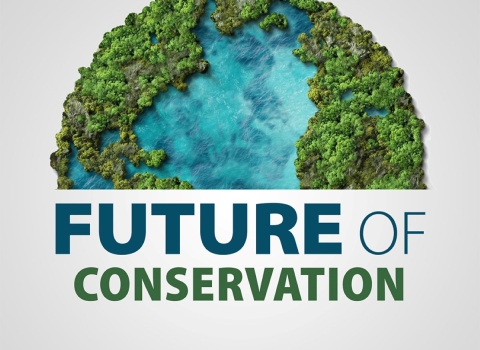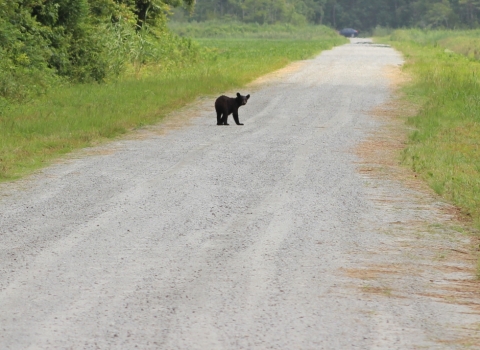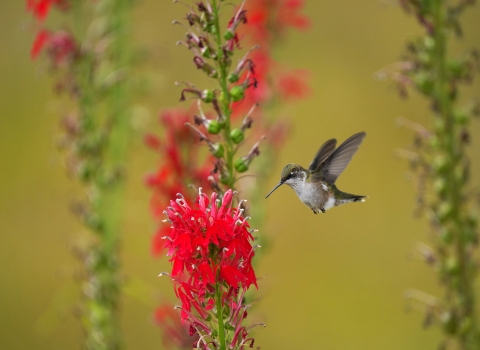It’s been said that the whole is greater than the sum of its parts. When it comes to habitat restoration, not only does it take quality native seeds and know-how, it takes a vision. We at the U.S. Fish and Wildlife Service know that making a future full of native grasses, functional wetlands and the wildlife that call the midwest home takes a lot of people power as well. With that in mind, we’re proud to announce new activities that have been designed specifically to protect shared natural resources in the midwest.
Peppered across the country, 206 new projects will be supported. Made possible by funding from the Bipartisan Infrastructure Law, five of these will be in the midwest where we will safeguard native grass seedlings, cleanup old mining toxins and hire interdisciplinary conservation leaders.
Learn about our projects in the midwest:
- Southern Iowa Grasslands Partnership, Iowa (Fiscal year 2024: $75,000; Total: $225,000) The U.S. Fish and Wildlife Service will work with private landowners and conservation partners to restore approximately 2,500 acres of priority grasslands. These acres are currently in agricultural production or low diversity, non-native, cool-season grasses. These acres will be revegetated and restored through seeding of high diversity, native vegetation.
- Midwest Grasslands Coordinator, Multiple units (Fiscal year 2024: $200,000; Total: $600,000) The U.S. Fish and Wildlife Service will fund a Midwest Grasslands Coordinator to convene and coordinate efforts across all relevant federal and non-federal partners in the midwest. This work will expand and accelerate the delivery of collaborative grasslands conservation within this critically endangered ecosystem for the benefit of wildlife and people.
- Midwest Region Seed Capacity Building, Multiple units (Fiscal year 2024: $319,000; Total: $563,500) The U.S. Fish and Wildlife Service will provide critical upgrades to increase the capacity of existing seed handling facilities that support multi-jurisdictional partners to support seed-based ecological restoration on public, private and Tribal lands. Seed capacity projects will benefit a diversity of partners and stakeholders including youth and underserved communities.
- Hackmatack Recreation Partnership, Illinois and Wisconsin (Fiscal year 2024: $109,000; Total: $342,000) Hackmatack National Wildlife Refuge is rapidly expanding its public land footprint within 50 miles of downtown Chicago, Illinois and Milwaukee, Wisconsin. In order to meet the needs of the community, Hackmatack National Wildlife Refuge will use these funds to hire a person who will engage multiple partners in underserved communities. This includes working with youth from the surrounding areas to complete new trails and lead efforts to eradicate invasive plants on more than 530 acres with the goal to enhance visitor safety and increase recreational opportunities.
- Shoal Creek Partnership Project, Missouri (Fiscal year 2024: $537,738; Total: $1,716,483) The U.S. Fish and Wildlife Service will be working as part of the Shoal Creek Partnership to restore lands in the Tri-State Mining District of southwest Missouri. Previous mine activity caused widespread heavy metal contamination in the soil and water restoration of these areas will benefit mussel species, such as the endangered Neosho mucket, bat species and migratory birds. The Shoal Creek Partnership is a group of state and federal agencies, non-profits and the Neosho National Fish Hatchery working together to restore more than 5,000 acres of private and public lands and a mile of stream through invasive removal, prescribed fire, planting, as well as stream projects across Barry, Newton, Lawrence, and Jasper counties.
Nearly $3.5 million will go into these midwestern projects, while nationally, more than $157 million in funding was announced from President Biden’s Investing in America agenda to restore our nation’s lands and waters through locally led, landscape-scale restoration projects. More than half of the projects will benefit historically underserved communities, advancing President Biden’s Justice40 Initiative, which aims to deliver 40 percent of the overall benefits of climate, clean energy and related investments to disadvantaged communities.




